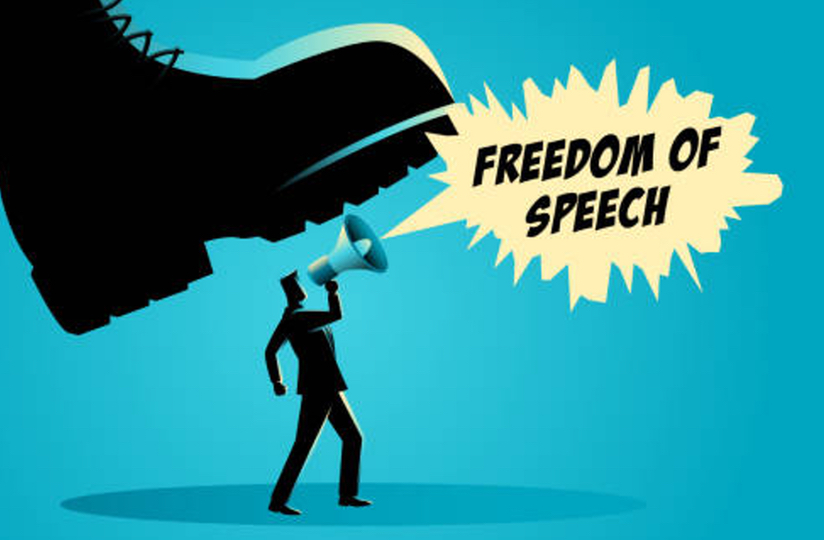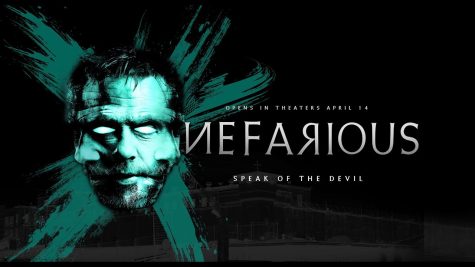Student opinion: Is speech really free?
Krajicek argues free speech should be reasonably restricted in today’s society
The term “free speech” is thrown around a lot nowadays. Speech is a relevant topic in the news cycle, and many different opinions have sprung up. Like all issues in today’s world, there are two sides to every coin: Free speech is good, or speech should be censored. Both arguments have merit, but the truth is, speech always is and always has been restricted. Not only is this a reality, but it is one that is conducive to a true and flourishing society.
In the grand scheme of history, absolute freedom of speech is an idea that is relatively new. The First Amendment to the United States Constitution explicitly says that Congress should make no law preventing the free exercise of speech. However, the founders of our great nation never meant this to be interpreted as “all speech should be allowed.” Anti-blasphemy and anti-obscenity laws have always been on the books, but they haven’t been enforced for some time.
Formally, free speech absolutism started with 20th-century American political philosopher Alexander Meiklejohn. As with many modern-day Americans, Meiklejohn believed that the government should place no restrictions on what average citizens are allowed to say in a political setting. He believed that if a nation is to remain autonomous, free speech absolutism is essential. Meiklejohn often used the defense “fight bad speech with even better speech.” This line of thinking is thrown around by many individuals today with similar trains of thought. The reality is, though, do we really want ideas such as child pornography and Satanism to be even platformed? A majority of moral and good people would say, “No.”
While Meiklejohn’s ideas were thoroughly rejected by every other country in the western world, his arguments have resonated with lots of today’s Americans. One prominent example is tech billionaire and self-proclaimed free-speech absolutist Elon Musk. Since acquiring the social media giant Twitter, Musk has loosened the restrictions on what people can say on the platform. The thing is, he has not completely opened up the social media service to free speech absolutist standards. Musk was recently criticized for banning accounts that parodied him, accounts that doxxed him and his family and journalist accounts that publicly criticized him and his policies. Even though these select profiles were banned for less than a week most of the time, the point still stands that they were kicked off the platform.
These Twitter bannings are indicative of society as a whole. Free speech absolutism sounds good in theory, but unless a society has a foolproof understanding of what is true and moral, there is no way to put it into practice. This is because in a completely free speech society, bad ideas will be platformed and eventually will gain a following. In contrast, every successful society has a “speech code” that they follow. The difference between speech codes, though, is that some are good, and some are not so good. For example, “hate speech” is widely considered unacceptable in today’s society. Almost everyone would agree that some hateful speech that overtly calls for violence should not be allowed. Although recent events may suggest otherwise, the majority of the public would certainly agree that Nazism and Satanism should not be platformed anywhere. The problem with hate speech, though, is that the term itself is vague. Academia and big tech use the term hate speech so much that they’ve essentially changed the definition to “speech that we don’t like.”
The problem is, the speech that they don’t like contains ideas that are conducive to a flourishing body politic. Instead of de-platforming Donald Trump and shadow-banning Ben Shapiro, the powers that be should ban accounts such as Kremlin-run Russian accounts and the ayatollah of Iran. Both of the latter profiles have openly called for violence on multiple occasions, while the former have simply spoken out against the censorship overlords.
To know what speech to ban, ultimately, is a subjective decision. Some might argue one type of speech should be banned, and others might think that another kind of rhetoric is harmful. When deciding which sort of political speech should be allowed, it is important to remember what has worked in the past. Free speech absolutism has never worked, and it results in a barbaric, anarchist society like 11th-century Vikings. On the other hand, speech codes like chivalry have resulted in flourishing societies that are still around today. The general public just has to be careful what speech they decide to prohibit. Moving too far to the censorship side can result in a devastating outcome such as Nazi Germany. When it comes time to decide which speech to ban, it is essentially important that society finds a happy medium between complete suppression of speech and a total anarchist civilization.
Your donation will support the student journalists of Yutan High School. Your contribution will help cover our annual website hosting costs, as well as allow us to purchase equipment and produce more in-print editions.

Zach is a senior and in his first year of journalism. He enjoys taking pictures. Outside journalism, Zach is involved in football, wrestling, track,...







